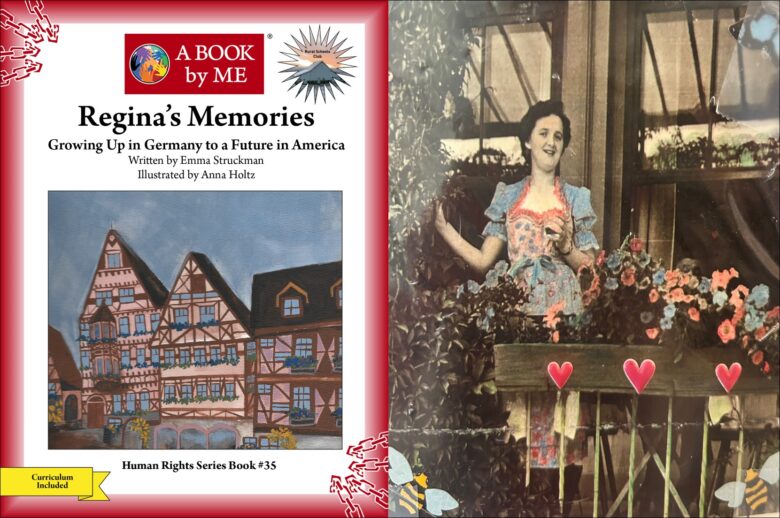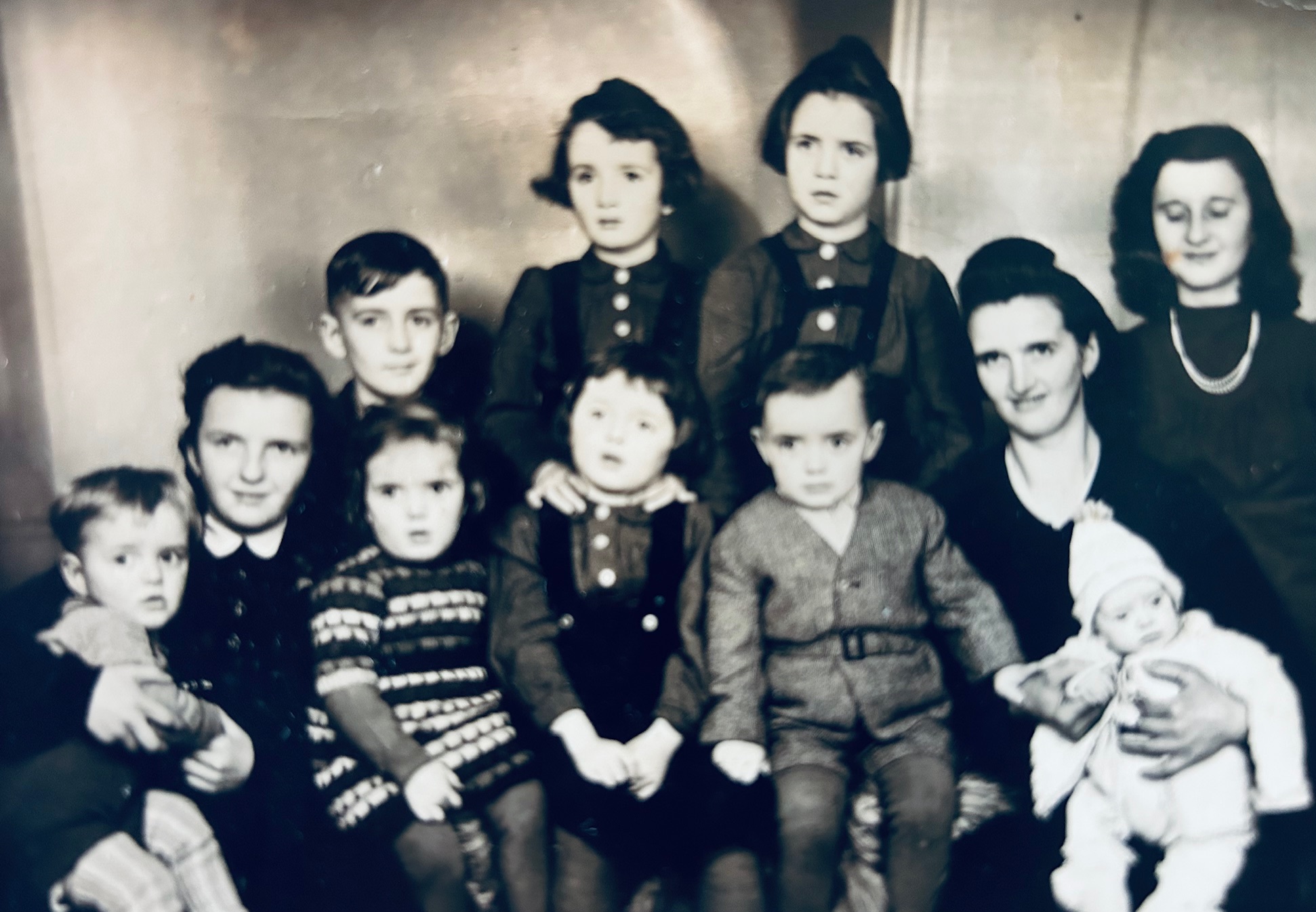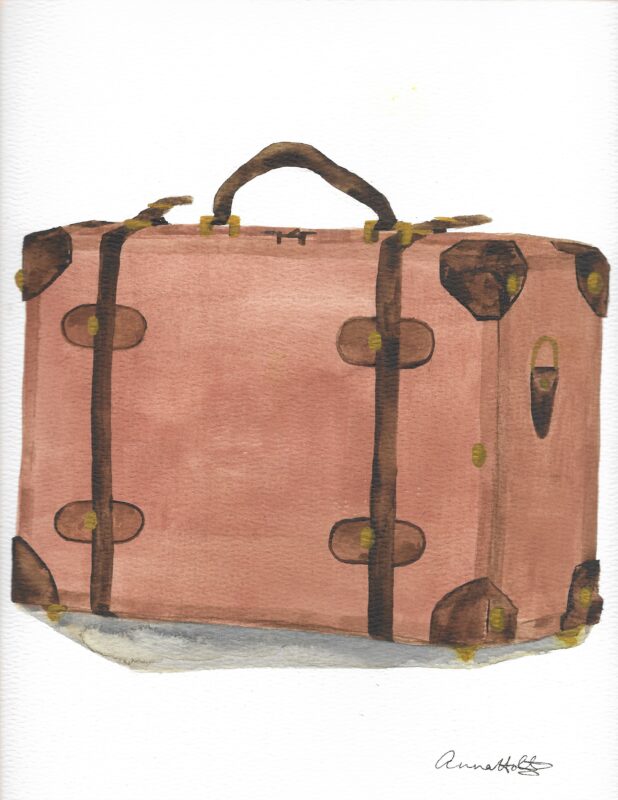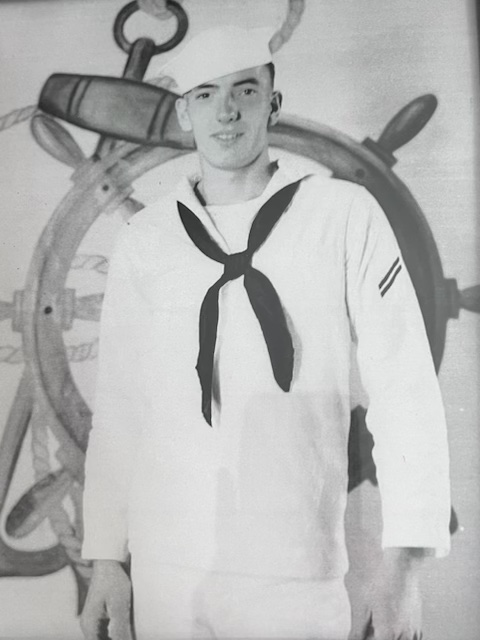Regina’s Memories
Growing Up in Germany to a Future in America
Written by Emma Struckman and Illustrated by Anna Holtz
A BOOK by ME - True Stories Written by Kids for Kids

I attended a Holocaust survivor event in Iowa where, during the Q&A session, a German woman shared her childhood experiences in Germany during World War II. Afterwards, I spoke with her, and we exchanged contact information. Soon after, I was fortunate to learn about Emma Struckman and her mother, a homeschool educator, who connected me with Anna Holtz, a remarkable young artist. This is how the book titled Regina’s Memories came together.
As Regina recounted the fear her mother and the children experienced during the Allied bombings of their city, I wondered if it was because there was a factory producing materials for the Nazi war effort. When I asked Regina, she explained that her father worked in a factory that mass-produced ball bearings. In fact, Schweinfurt, Germany, was the world capital of wheel bearing production. Understandably, her mother wanted to ensure her children’s safety, so they relocated to a small village with the help of a Russian POW.
After the war, Regina’s sister met and married an American soldier and moved to Iowa. During a visit, Regina met his brother, and the rest is history—they married and started a family together. I believe it’s essential to teach children about the experiences of a typical German family during the war. This fosters critical thinking and deepens their understanding of history. Additionally, it promotes empathy, a very important lesson for students to learn in the classroom.
Deb Bowen
Executive Director Understanding Works
 “I learned about Regina and realized she doesn’t live far from me. I’m grateful for this opportunity to learn and teach other kids about life in Germany during WWII. Also, thankful for such an exceptional artist joining me in this effort to preserve Regina’s important story. Regina is a wonderful example of a faithful woman. She demonstrates wisdom, honor, forgiveness, honesty, and the ability to love deeply.” – Emma Struckman, Author
“I learned about Regina and realized she doesn’t live far from me. I’m grateful for this opportunity to learn and teach other kids about life in Germany during WWII. Also, thankful for such an exceptional artist joining me in this effort to preserve Regina’s important story. Regina is a wonderful example of a faithful woman. She demonstrates wisdom, honor, forgiveness, honesty, and the ability to love deeply.” – Emma Struckman, Author
 “I loved collaborating with Emma to present Regina’s incredible and inspiring story of the life of a little girl who courageously lived in Nazi Germany.” – Anna Holtz, Illustrator
“I loved collaborating with Emma to present Regina’s incredible and inspiring story of the life of a little girl who courageously lived in Nazi Germany.” – Anna Holtz, Illustrator
Regina Borche Day – A German Child
The sirens blared a chilling wail that sliced through the stillness of night. This happened over and over again in Schweinfurt, Germany. Young Regina Borche’s mother Babetta was always there, but her German father sometimes had to work at the factory. This factory became an industrial hub thanks to Friedrich Fischer, a man who invented a machine that made it possible to mass produce ball bearings in 1883. Because of him, Schweinfurt became the world capital of wheel bearing production.
This meant lots of jobs, and Regina’s father Fritz worked there. When WWII started, this employment kept him from serving in the army since his work was very important to the war effort. While this factory employed many people, it also put many civilian lives in danger during the war. There was little freedom for Germans at this time. When Fritz wanted an update on the war, he covered his head with a blanket and listened secretly to the news. The Nazis prohibited deliberate listening to any foreign radio station under threat of a prison sentence. Fritz couldn’t risk anyone seeing or hearing him listening. It was a frightening time.
Regina had many siblings and, during the holidays, they put sheets up and made a stage. The children cut out stars and performed a play in their little home theater. They sang songs and recited poems from their school books. Despite the war, they were happy. Many times, Regina cried out, “Mom, Mom, Kurt is misbehaving again!”

Regina’s Family – She’s sitting in the middle with sister Dora with her hands on her shoulder behind her.
Dora was one of Regina’s older sisters and she could be ornery. She often tried to choke Regina, as you can see in a family photograph shown in this book. Regina just ignored her. Dora called their little brother Georg names, and she sometimes threw rocks at the neighbors. Trouble often followed young Dora, but she turned out to be a good woman. As adults, Regina and Dora were wonderful friends.
One night Regina remembers hearing a big bang as a bomb exploded behind the family as they ran across the street. Suddenly, the air pressure pushed them forward. Three-year-old Regina remembers holding on to her mother’s clothing as she carried a young baby. In her heart, Regina just wanted to be safe with her mother. Thankfully, the family was safe. But that wasn’t enough for mother Babetta. She wanted her children to live somewhere safer. That’s how two Russian Prisoners of War (POWs) were ordered to load up their belongings. Then the mother and her children climbed into a semi-truck and went somewhere east where there would be no bombings. The village was called Aubstadt. Regina went back there to visit in 1988 with all her sisters. She remembers standing in the bakery in her mother’s hometown as tears came to her eyes.

During the war her father Fritz continued to work at the factory. Production was concentrated in Schweinfurt, whose five plants turned out nearly two-thirds of Germany’s ball bearings and roller bearings. Operating from bases in the United Kingdom, the US Army Air Force flew missions over occupied Europe alongside their Royal Air Force counterparts from the Bomber Command. The Eighth Air Force attack against the ball bearing factories on October 14, 1943, became known as “Black Thursday.” The Allies hoped to reduce German infrastructure and its capacity to support the Nazi war effort.
While the Allied raids were successful in hitting the targets, the loss of life was too great; itcost the Allies 60 bombers and many highly trained crews. In addition, the results of the bombings were temporary as the industrious Germans recovered quickly. Nonetheless, in January 1944 the world saw the air war begin to tilt toward the Allies’ favor. The war ended in Europe on September 2, 1945.
After the war, Regina’s sister Gertrud became a war bride. She married a man named Ivan Day from Iowa. After living in the U.S., Gertrud became homesick, with two children and one on the way. She and her husband were planning to build a new home when Regina decided to go to the U.S to help her in 1956. When Regina arrived, she cleaned, washed in a wringer washing machine and cooked for Gertrud’s family. A few days after she arrived, she met Ivan’s brother Kenny who was a Korean War Veteran. He served in the U.S. Navy. Next thing you know, he invited Regina to go on a drive and soon they were married. He was 25 and she was 18. Today she calls him a man of great honor. They happily raised their six children, Duane, Barbara, Doris, Susan, Nancy and Steve, in Muscatine, Iowa.

Regina’s husband Kenny
Now a woman in her 80s, Regina is a grandma and great-grandma. She wants school children to know that as WWII drew to a close, Hitler sought the rapid annihilation of every remaining Jew. He had his Nazis murder six million Jews in his concentration camps. Countless others suffered from PTSD from the horrors they lived through. Regina also wants students to know that she appreciates the Tuskegee Airman. They were a group of Black pilots, navigators, and bombardiers who served in World War II. They were trained at Tuskegee University, which was chosen for its airfield, civilian pilot training program and graduates who scored high on flight aptitude exams. The Tuskegee Airmen’s success in escorting bombers during the war helped to contribute to the eventual integration of the U.S. Armed Services. Regina says many lives all around the world would have been very different if it hadn’t been for a man named Adolf Hitler (aka, the devil). She thanks God for President Roosevelt and his wife Eleanor who had a significant impact on American society and global human rights.

Regina’s Memories – Growing Up in Germany to a Future in America
A BOOK by ME, a book series developed by Deb Bowen, empowers students to preserve history by telling the story of unsung heroes in our communities. For the young participants, it’s a guided cross-curricular project that gathers stories of people who do amazing things but have received little or no recognition. Students learn how to publish a picture book that is a primary source document with photographs and a biography.
Since 2003, Deb Bowen has been arranging meetings between students and individuals from the WWII generation. This intergenerational storytelling results in unique storybooks written and illustrated by kids for kids in the A BOOK by ME series. More about Deb Bowen >





